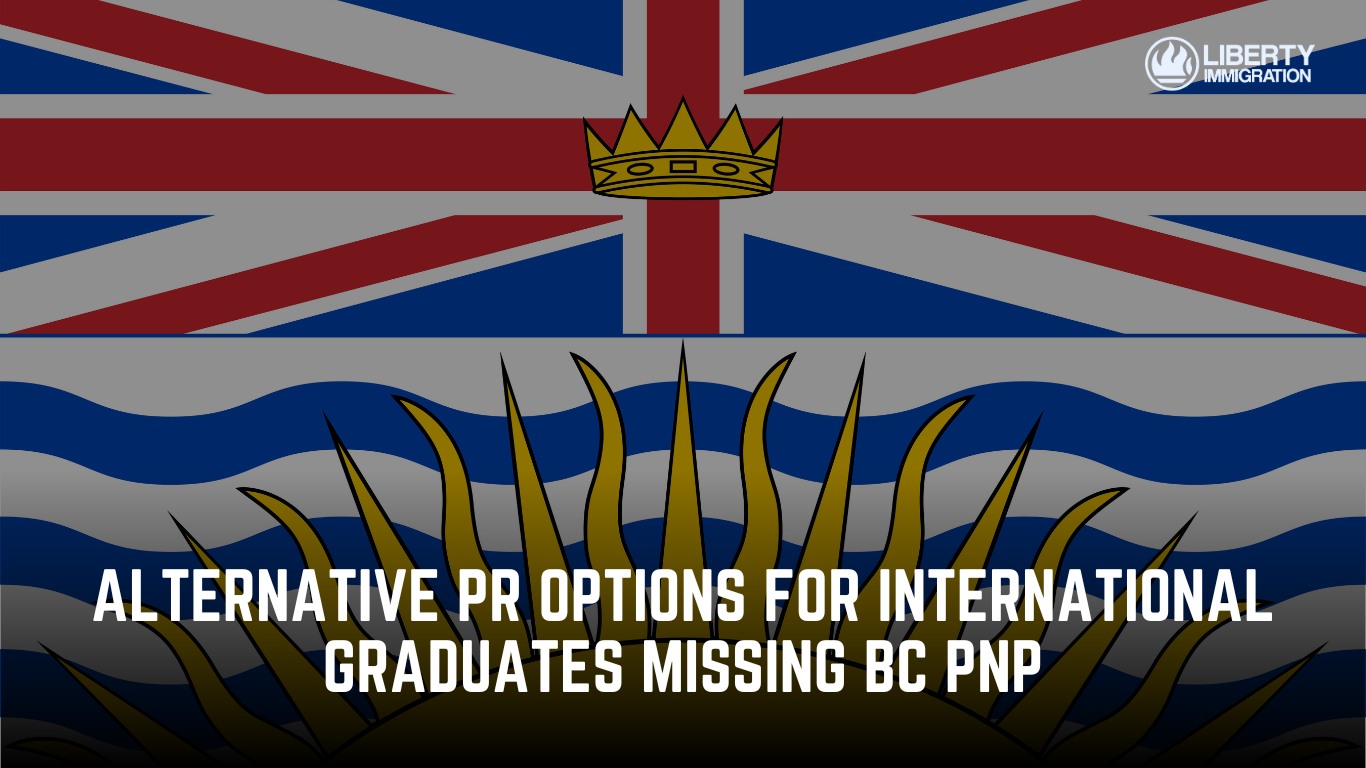Alternative PR Options for International Graduates Missing BC PNP

Missed the BC PNP as an International Graduate? Here Are Your Best Options for Canadian PR
So, you’ve studied in beautiful British Columbia, graduated, and started dreaming about permanent residency in Canada… only to find out that the BC Provincial Nominee Program (BC PNP) didn’t work out for you.
If that sounds like your situation, don’t worry—you’re not alone, and more importantly, you’re not out of options.
Canada has a wide range of permanent residency (PR) pathways, and missing out on the BC PNP doesn’t mean the end of your PR journey. In fact, it could be the start of a brand-new route that works even better for you!
Why the BC PNP Might Not Have Worked Out for You
First, let’s address the elephant in the room: Not everyone can secure PR through the BC PNP. The program is competitive and based on a points system, similar to other immigration programs in Canada. If your score wasn’t high enough, or if your job offer didn’t meet the required standards, you might have missed out.
But here’s the good news—there are plenty of federal and provincial pathways that could still work for you.
Your Other Options for Canadian PR
1. Use Your Work Experience in Canada: The Canadian Experience Class (CEC)
Have you been working in Canada after graduation, perhaps through a Post-Graduation Work Permit (PGWP)? Then the Canadian Experience Class program under the Express Entry system might be a perfect fit for you.
To qualify, you’ll need:
- At least one year of skilled work experience in Canada (in TEER 0, 1, 2, or 3 jobs)
- Language test results
- A completed Express Entry profile
This is a strong pathway because it values Canadian work experience—and that’s something international grads like you already have an edge in.
2. Consider Express Entry Directly
Even if you’re not eligible under CEC, don’t overlook Express Entry itself. It manages three federal immigration programs: CEC, the Federal Skilled Worker Program (FSWP), and the Federal Skilled Trades Program (FSTP).
If your education and experience are enough, applying through FSWP could be a great option—especially if you have strong language skills and an educational credential assessment (ECA) for your foreign degree, if applicable.
3. Explore Other Provincial Nominee Programs (PNPs)
BC isn’t the only province with a nominee program. Every Canadian province (except Quebec and Nunavut) has its own PNP streams designed to attract skilled workers.
Some provinces are actively inviting international grads, including:
- Ontario – Offers a stream specifically for international student graduates
- Alberta – Has a pathway for graduates working in in-demand sectors
- Nova Scotia – Every now and then launches targeted draws based on labor market needs
Each PNP has its own rules and requirements. But your education in Canada already puts you ahead, especially in provinces that are seeking younger, educated immigrants.
4. Try the Atlantic Immigration Program (AIP)
If you’re open to relocating to Nova Scotia, New Brunswick, Newfoundland and Labrador, or Prince Edward Island, the AIP could be a brilliant move.
This program is employer-driven, meaning you’ll need a job offer from a designated employer—but it’s a lot more accessible for recent grads.
- No work experience needed if you graduated from one of the Atlantic provinces
- Lower language score requirements
- Fast-tracked processing
What’s more? These provinces are known for friendly communities and lower costs of living, which could help you settle in more smoothly.
5. The Rural and Northern Immigration Pilot (RNIP)
Love the idea of living in a smaller, tight-knit community? The RNIP might be your path to PR.
This is another community-based, employer-driven program. It allows select smaller communities to directly recommend candidates for PR.
If you’re working in one of these communities and your employer is on board, this could be a much quicker route than waiting around in Express Entry.
6. Don’t Overlook Quebec (It Has Its Own System!)
Quebec has a completely separate immigration system—but international grads can still benefit.
The Quebec Experience Program (PEQ) is one to look into if you’ve studied in Quebec and can meet their French-language requirements.
While language might be a hurdle, those who already speak French or are willing to learn open up a whole new PR track that many overlook.
So, What’s the Best Option for You?
That really depends on your situation. Let’s break it down with a few questions:
- Have you worked at least one year in a skilled job in Canada?
- Are you open to moving to another province?
- Do you have strong English—or even better—French skills?
If you answered “yes” to any of these, then the door to PR is still wide open.
Pro Tips to Boost Your PR Chances
Whatever path you choose, these tips can help you stand out:
- Keep all your documents up-to-date—especially your work experience letters and language test scores
- Research new PNP draws regularly—they change every few weeks
- Use the CRS calculator to find out how to boost your points
- Consider getting an immigration consultant to help navigate tricky applications
Final Thoughts: Your PR Journey Isn’t Over
Getting permanent residency in Canada as an international graduate is rarely a straight road. Sometimes, your first choice—like the BC PNP—doesn’t pan out. And that’s okay!
Think of it like taking a detour on a road trip. Sure, it’s a little longer, but sometimes, that new route offers even better views and opportunities.
The key is being flexible, proactive, and open to exploring lesser-known—but just as valuable—paths.
You’ve already come this far by studying in Canada. Your PR success could be just one well-researched application away.
Got questions or need help deciding the best route for you? Leave a comment or reach out—we’d love to hear your story!



